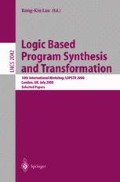Abstract
We develop a methodology for constructing semantics-based analyses of programs by approximating their probabilistic semantics. The framework we introduce resembles the one based on Galois connections used in abstract interpretation, the main difference being the choice of linear space structures instead of order-theoretic ones as semantical (concrete and abstract) domains. The intrinsic quantitative nature of linear spaces makes the method suitable for investigations on the problem of a numerical comparison of abstract interpretations with respect to their precision. After introducing the notion of probabilistic abstract interpretation, we define a measure of its precision by means of the norm of a linear operator which encodes the “incompleteness” of the abstraction. Finally we show the application of our results in a series of classical examples.
Access this chapter
Tax calculation will be finalised at checkout
Purchases are for personal use only
Preview
Unable to display preview. Download preview PDF.
References
Frederick J. Beutler. The operator theory of the pseudo-inverse. Journal of Mathematical Analysis and Applications, 10:451–470,471-493, 1965.
Stephen L. Campbell and D. Meyer. Generalized Inverse of Linear Transformations. Constable and Company, London, 1979.
A. Cortesi, G. File’, and W. Winsborough. The Quotient of an Abstract Interpretation. Theoretical Computer Science, 202(1-2):163–192, 1998.
Patrick Cousot. Constructive design of a Hierarchy of Semantics of a Transition System by Abstract Interpretation. In S. Brooks and M. Mislove, editors, 13th International Symposium on Mathematical Foundations of Programming Semantics (MFPS97), volume 6 of Electronic Notes in Theoretical Computer Science, Amsterdam, 1997. Elsevier.
Patrick Cousot and Radhia Cousot. Abstract Interpretation: A Unified Lattice Model for Static Analysis of Programs by Construction or Approximation of Fixpoints. In Symposium on Principles of Programming Languages (POPL), pages 238–252, Los Angeles, 1977.
Patrick Cousot and Radhia Cousot. Systematic Design of Program Analysis Frameworks. In Symposium on Principles of Programming Languages (POPL), pages 269–282, San Antonio, Texas, 1979.
Patrick Cousot and Radhia Cousot. Abstract Interpretation and Applications to Logic Programs. Journal of Logic Programming, 13(2-3):103–180, July 1992.
D. Dams, R. Gerth, and O. Grumberg. Abstract Interpretations of Reactive Systems. ACM Trans. Program. Lang. Syst., 19(2):253–291, 1997.
Alessandra Di Pierro and Herbert Wiklicky. An operational semantics for Probabilistic Concurrent Constraint Programming. In P. Iyer, Y. Choo, and D. Schmidt, editors, ICCL’98-International Conference on Computer Languages, pages 174–183. IEEE Computer Society Press, 1998.
Alessandra Di Pierro and Herbert Wiklicky. Probabilistic Concurrent Constraint Programming: Towards a fully abstract model. In L. Brim, J. Gruska, and J. Zlatuska, editors, MFCS’98-Mathematical Foundations of Computer Science, volume 1450 of Lecture Notes in Computer Science, pages 446–455, Berlin-New York, August 1998. Springer Verlag.
Alessandra Di Pierro and Herbert Wiklicky. Concurrent Constraint Programming: Towards Probabilistic Abstract Interpretation. In M. Gabbrielli and F. Pfenning, editors, Proceedings of PPDP’00-Priciples and Practice of Declarative Programming, pages 127–138, Montéeal, Canada, September 2000. ACM SIGPLAN, Association of Computing Machinery.
John W. Eaton. Octave. Boston, MA, 1997.
R. Giacobazzi and F. Ranzato. Completeness in abstract interpretation: A domain perspective. In M. Johnson, editor, Proc. of the 6th International Conference on Algebraic Methodology and Software Technology (AMAST’97), volume 1349 of Lecture Notes in Computer Science, pages 231–245. Springer-Verlag, Berlin, 1997.
Neil D. Jones and Flemming Nielson. Abstract interpretation: A semantic-based tool for program analysis. In S. Abramsky, D. M. Gabbay, and T. S. E. Maibaum, editors, Semantic Modelling, volume 4 of Handbook of Logic in Computer Science, pages 527–636. Clarendon Press, Oxford, 1995.
Dexter Kozen. Semantics for probabilistic programs. Journal of Computer and System Sciences, 22:328–350, 1981.
Gerard J. Murphy. C*-Algebras and Operator Theory. Academic Press, San Diego, 1990.
Flemming Nielson, Hanne Riis Nielson, and Chris Hankin. Principles of Program Aanalysis. Springer Verlag, Berlin-Heidelberg, 1999.
Viktor V. Prasolov. Problems and Theorems in Linear Algebra, volume 134 of Translation of Mathematical Monographs. American Mathematical Society, Providence, Rhode Island, 1994.
Walter Rudin. Functional Analysis. International Series in Pure and Applied Mathematics. McGraw-Hill, 1991. Second Edition.
N. Saheb-Djahromi. CPO’s of measures for nondeterminism. Theoretical Computer Science, 12:19–37, 1980.
Author information
Authors and Affiliations
Rights and permissions
Copyright information
© 2001 Springer-Verlag Berlin Heidelberg
About this paper
Cite this paper
Di Pierro, A., Wiklicky, H. (2001). Measuring the Precision of Abstract Interpretations. In: Logic Based Program Synthesis and Transformation. LOPSTR 2000. Lecture Notes in Computer Science, vol 2042. Springer, Berlin, Heidelberg. https://doi.org/10.1007/3-540-45142-0_9
Download citation
DOI: https://doi.org/10.1007/3-540-45142-0_9
Published:
Publisher Name: Springer, Berlin, Heidelberg
Print ISBN: 978-3-540-42127-6
Online ISBN: 978-3-540-45142-6
eBook Packages: Springer Book Archive

